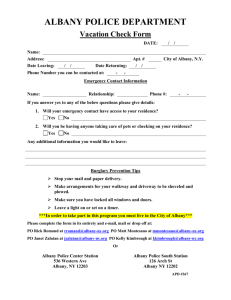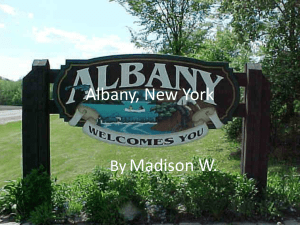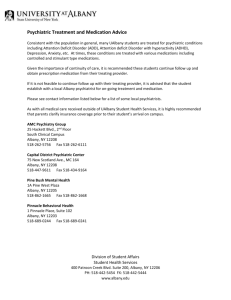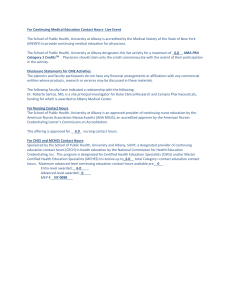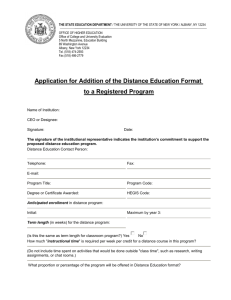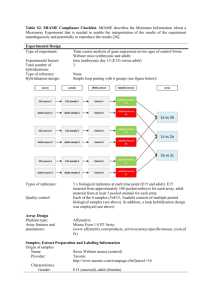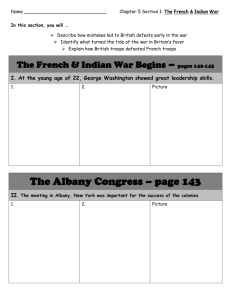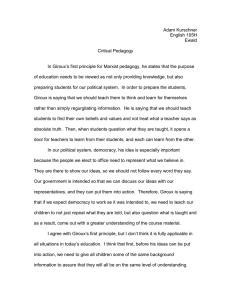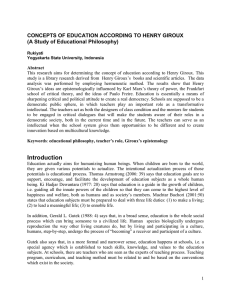Workshop
advertisement
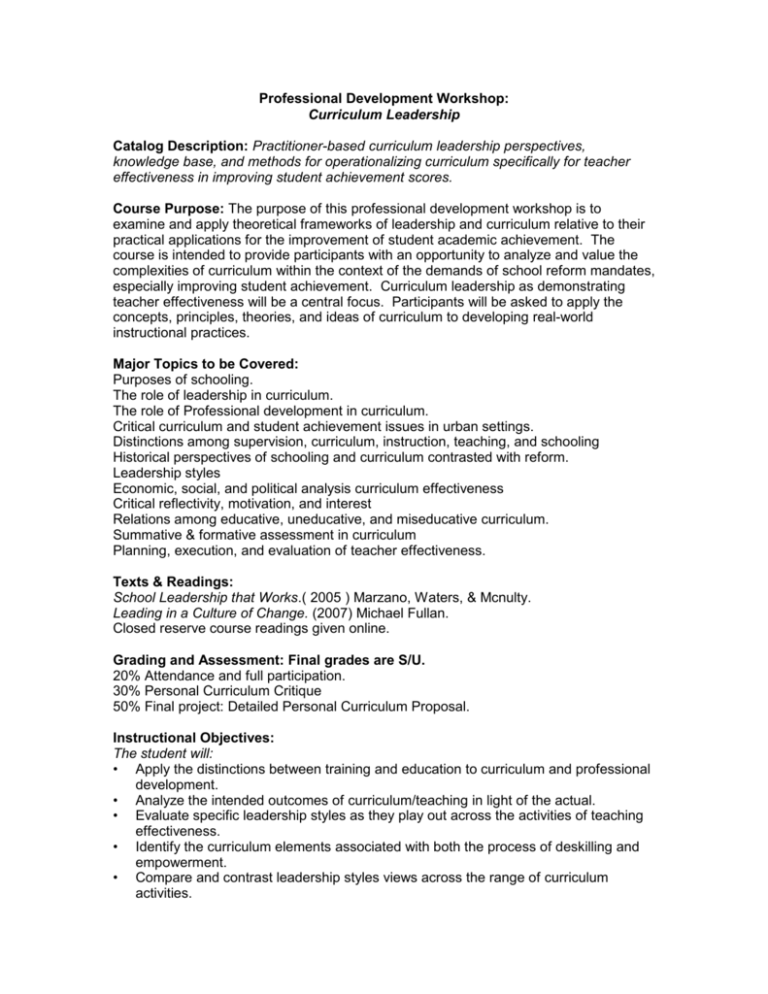
Professional Development Workshop: Curriculum Leadership Catalog Description: Practitioner-based curriculum leadership perspectives, knowledge base, and methods for operationalizing curriculum specifically for teacher effectiveness in improving student achievement scores. Course Purpose: The purpose of this professional development workshop is to examine and apply theoretical frameworks of leadership and curriculum relative to their practical applications for the improvement of student academic achievement. The course is intended to provide participants with an opportunity to analyze and value the complexities of curriculum within the context of the demands of school reform mandates, especially improving student achievement. Curriculum leadership as demonstrating teacher effectiveness will be a central focus. Participants will be asked to apply the concepts, principles, theories, and ideas of curriculum to developing real-world instructional practices. Major Topics to be Covered: Purposes of schooling. The role of leadership in curriculum. The role of Professional development in curriculum. Critical curriculum and student achievement issues in urban settings. Distinctions among supervision, curriculum, instruction, teaching, and schooling Historical perspectives of schooling and curriculum contrasted with reform. Leadership styles Economic, social, and political analysis curriculum effectiveness Critical reflectivity, motivation, and interest Relations among educative, uneducative, and miseducative curriculum. Summative & formative assessment in curriculum Planning, execution, and evaluation of teacher effectiveness. Texts & Readings: School Leadership that Works.( 2005 ) Marzano, Waters, & Mcnulty. Leading in a Culture of Change. (2007) Michael Fullan. Closed reserve course readings given online. Grading and Assessment: Final grades are S/U. 20% Attendance and full participation. 30% Personal Curriculum Critique 50% Final project: Detailed Personal Curriculum Proposal. Instructional Objectives: The student will: • Apply the distinctions between training and education to curriculum and professional development. • Analyze the intended outcomes of curriculum/teaching in light of the actual. • Evaluate specific leadership styles as they play out across the activities of teaching effectiveness. • Identify the curriculum elements associated with both the process of deskilling and empowerment. • Compare and contrast leadership styles views across the range of curriculum activities. 2 • • • • • • • • • • • • • • • Recognize and be able to use principles of critical reflectivity in the development and outcome of effective student achievement practices. Understand and recognize the forces and factors affecting the marginalization of the learners in the process of achievement and curriculum Apply the matrix of race, class, gender, ethnicity, disability, and life-style preference to curriculum approaches. Apply elemental principles of reflectivity and empowerment in critique of student achievement. Use fundamental principles of deconstruction to personally engage teaching analysis. Understand and value the instrumental nature of professional knowledge. Apply distinctions between evaluation and assessment (formative-summative) in collecting, using, and interpreting data. Understand and apply notions of performative, dispositional, and conditional uses of content-area knowledge. Recognize and use distinctions among associative, interpretive, applicative, and replicative forms of knowledge. Apply basic tenets of power relations to effective teaching and curriculum. Utilize the principles of continuity and interaction in the development of the professional intellectual character of educators. Understand and apply notions of content and construct validity in the role of assessment. Examine and analyze differences in construct validity associated with traditional and empowering teaching practices. Understand and use principles of judgment in assessment. Use principles of motive state, motivation, incoherence, focal situations, and interest to develop instructional activities in curriculum practice. Reference List Alexander, T. M. (1987). John Dewey's theory of art, experience, and nature: The horizons of feeling. Albany, NY: State University of New York Press. Aronowitz, S., and Giroux, H. (1993). Education still under siege (2nd ed.). Westport, CT: Bergin & Garvey. Aronowitz, S., and Giroux, H. (1991). Postmodern education: Politics, culture, and social criticism. Minneapolis, MN: University of Minnesota Press. Beyer, L. E., and Apple, M. W. (eds.). (1988). The curriculum: Problems, politics, and possibilities. Albany, NY: State University of New York Press. Britzman, D. P. (1991). Practice makes practice: A critical study of learning to teach. Albany, NY: State University of New York Press. Cherryholmes, C. H. (1988). Power and criticism: Poststructural investigations in education. Advances in Contemporary Educational Thought, 2. New York, NY: Teachers College Press. 3 Cohn, M. M., and Kottkamp, R. B. (1993). Teachers: The missing voice in education. Albany, NY: State University of New York Press. Dewey, J. (1938). Experience and education. New York, NY: Macmillan. Doll, W. E. Jr. (1993). A post-modern perspective on curriculum. Advances in Contemporary Educational Thought, 9. New York, NY: Teachers College Press. Donmoyer, R., and Kos, R. (1993). At-risk students: Portraits, policies, programs, and practices. Albany, NY: State University of New York Press. Fullan, M. (2007) Leading in a Culture of Change. NY: Jossey-Bass. Giroux, H. A. (ed.). (1991). Postmodernism, feminism, and cultural politics. Albany, NY: State University of New York Press. Giroux, H. A. (1988). Teachers as intellectuals: Toward a critical pedagogy of learning. New York: Bergin & Garvey. Giroux, H. A., and McLaren, P. (eds.). (1989). Critical pedagogy, the state, and cultural struggle. Albany, NY: State University of New York Press. Hoover, R. (1998). Teaching Methods for Empowerment: The Pedagogical Imperative. NJ: Prentice Hall. Hoover, R. & Kindsvatter, R. (1997) Democratic Discipline: Foundation and Practice. NJ: Prentice Hall. Hutcheon, L. (1988). A poetics of postmodernism: History, theory, fiction. London: Routledge. Kincheloe, J. L. (1993). Toward a critical politics of teacher thinking. Westport, CT: Bergin & Garvey. Kinchelor, J. L., and Pinar, W. F. (eds.). (1991). Curriculum as social psychoanalysis: The significance of place. Albany, NY: State University of New York Press. Lather, P. (1991). Getting smart: Feminist research and pedagogy with/in the postmodern. New York, NY: Routledge. Marzano, Waters, & Mcnulty (2007). School Leadership that Works. Association for Supervision and Curriculum Development. McCutcheon, G. (1995). Developing the curriculum. White Plains, NY: Longman. Noddings, N. (1993). Educating for intelligent belief or unbelief. New York, NY: Teachers College Press. 4 Ornstein, A. C., and Behar, L. S. (1995). Contemporary issues in curriculum. Boston, MA: Allyn and Bacon. Pinar, W. F., and Reynolds, W. M. (eds.). (1992). Understanding curriculum as phenomenological and deconstructed text. New York, NY: Teachers College Press. Pratte, R. (1977). Ideology and education. New York, NY: David McKay Co. Pratte, R. (1988). The civic imperative: Examining the need for civic education. Advances in Contemporary Educational Thought, 3. New York, NY: Teachers College Press. Rorty, R. (1979). Philosophy and the mirror of nature. Princeton, NJ: Princeton University Press. Spring, J. (1986). The American school 1642-1985. New York, NY: Longman. Tanner, D., and Tanner, L. N. (1980). Curriculum development: Theory into practice (2nd ed.). New York, NY: Macmillan. Weis, L. (1990). Working class without work: High school students in a de-industrializing economy. New York, NY: Routledge.
